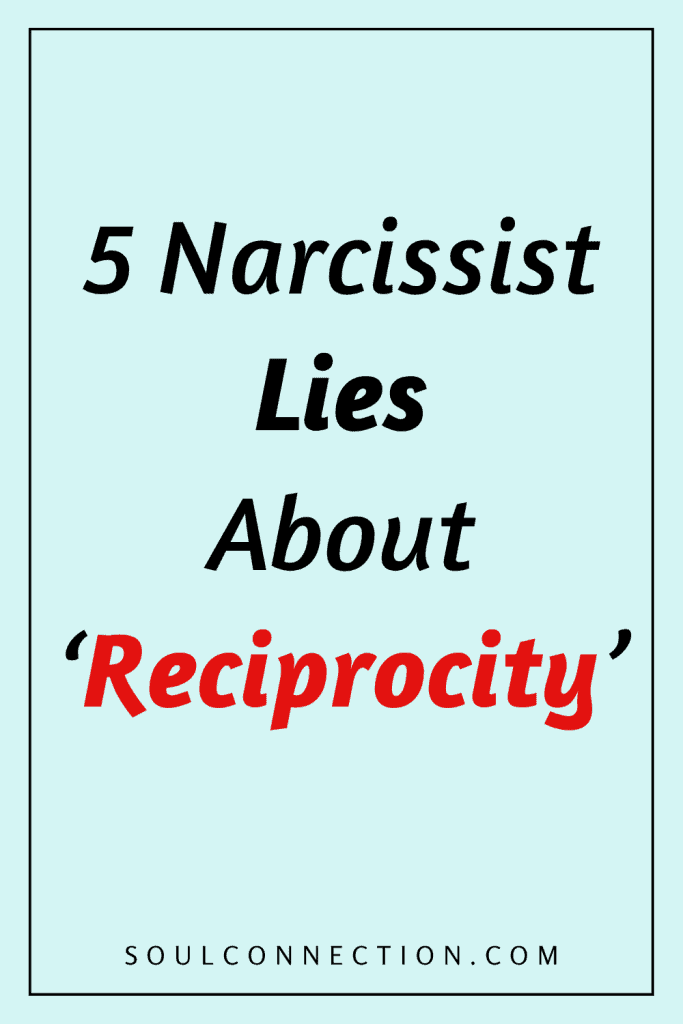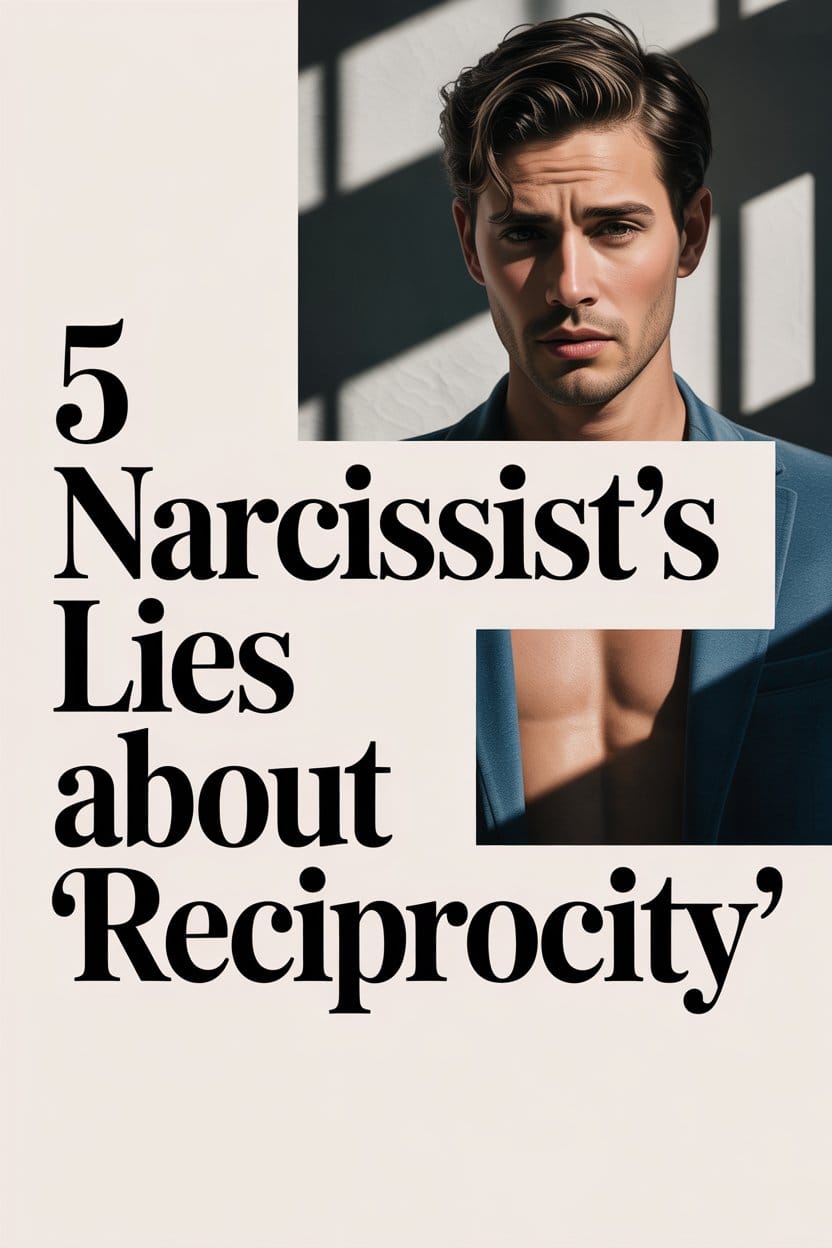Ever argued with a narcissist about who does more in the relationship? Spoiler: It’s probably you.
Reciprocity is supposed to be the golden rule of healthy relationships, but when a narcissist gets involved, it turns into a twisted game of “guess what I want, give it to me, and maybe you’ll get a breadcrumb.”
If you’ve ever felt like you’re stuck in a one-way love story—where you do all the giving and your partner keeps score like a Monopoly banker with a side hustle in gaslighting—you’re not alone.
Here are five of the most common lies narcissists tell about reciprocity, and how to spot them before you end up writing IOUs for favors you never actually received.
1. “I Always Give as Much as I Get”
Ever heard this one, delivered with the sincerity of a toddler claiming they didn’t eat the last biscuit?
Narcissists love to claim they’re the unsung hero of the relationship, bravely shouldering fifty percent (or more, if you buy their story) of the emotional and practical load.
Reality check: They might offer a grand gesture once every quarter—announcing it like a royal decree—then coast on that for months.
Meanwhile, you’re handling the groceries, emotional check-ins, and remembering their third cousin’s dog’s birthday, all while being told you’re “not appreciating how much I do.”
Here’s the rub: Narcissists are masters of selective memory. They’ll remember every favor they’ve done for you since 2012, but conveniently forget the mountain of little things you do every day.
When challenged, expect a highlight reel of their rare acts of kindness—but don’t bother looking for the supporting footage of their daily contributions, because it doesn’t exist.
What can you do about it tonight? Start tracking the invisible labor.
Write it down. When the next argument comes, at least you’ll have receipts—even if they act like you’re producing ancient scrolls in hieroglyphs.
2. “You Owe Me—After Everything I’ve Done”
Classic narcissist move: twist every gesture into a debt. Whether it’s driving you to the airport once or letting you pick the restaurant (just that one time, and only because they wanted sushi anyway), these acts become leverage.
Reciprocity, in healthy relationships, is about give and take. With a narcissist, it’s more like give and… well, give some more, and then apologize for not giving enough.
This lie comes gift-wrapped in guilt. The moment you ask for something—a night out, support during a stressful week, or just a bit of space—you’ll be reminded of every “sacrifice” they’ve ever made.
Suddenly, you’re the one who’s selfish or ungrateful, even if your requests are basic relationship hygiene.
Spotting this tactic is the first step. If every favor comes with a “You owe me,” it’s time to call out the emotional accounting. Set boundaries around emotional blackmail.
Try phrases like, “I appreciate what you did, but I don’t think one favor means I now owe you everything.” Practice saying it in the mirror if you need to. (Bonus points for the raised eyebrow.)
3. “If You Loved Me, You Would…”
Few things are as manipulative as the old “If you loved me…” chestnut. Narcissists wield this statement like a magic wand; suddenly, any act of self-care or independence is a betrayal, and every demand from them becomes a test of your devotion.
This isn’t reciprocity. It’s emotional extortion, wrapped in cheap sentimentality. Real love means supporting each other’s needs, not using them as emotional currency.
When your partner equates their happiness with your constant compliance, it’s not love. It’s control.
Here’s what happens: You start doubting yourself. “Am I really being selfish? Is it wrong to need a night alone, or to spend time with friends?” Next thing you know, your world shrinks to fit inside their comfort zone.
What helps? Name the game. Say, “I love you, but my boundaries and needs matter too.” If they pout, whinge, or deploy the silent treatment, that’s more evidence of manipulation, not evidence you need to bend over backward.
4. “We’re Both Equally Flawed”
Ah, the great equalizer. Whenever you point out an imbalance, the narcissist dusts off this classic: “Well, nobody’s perfect, and we both have our issues.” On the surface, it sounds humble—who can argue with a little shared imperfection?
Look closer: this is a dodge. Instead of addressing how they regularly suck up all the oxygen in the relationship, they flatten everything into a bland, flavorless mush of mutual blame.
That way, nothing changes—except your growing sense of frustration.
This one’s especially tricky because it feels polite to admit your own faults. Everyone has flaws, right? But when one person is chronically taking advantage and the other is chronically accommodating, “equal” is the last word that should apply.
Notice when this tactic pops up. If every attempt at an honest conversation about unfairness ends in “We’re both at fault,” don’t let it slide.
Stick to specifics: “I’m open to talking about both our patterns, but I’d like to focus on this issue right now.” If they evade or flip the script, don’t chase the argument down a rabbit hole. Let the topic stand.
5. “I Thought We Didn’t Keep Score”
If only. “We don’t keep score around here”—just the anthem of every narcissist who’s winning 100 to zero and wants to keep it that way. What they really mean: “I don’t want you to notice how much I take.”
Healthy couples don’t tally every little thing, but they do have a sense of shared effort. The narcissist uses anti-scorekeeping as a shield.
The moment you mention feeling unappreciated or overburdened, they’ll clutch their pearls at the horror of “scorekeeping,” conveniently glossing over their own mental spreadsheet of your perceived failures.
The trick here is that you start to second-guess your own expectations. “Am I being petty? Shouldn’t I just give without expecting anything back?” Generosity gets twisted into martyrdom.
Spot this lie by flipping the script: When they accuse you of “keeping score,” ask, “If we’re not keeping score, why do you get upset when I ask for help?”
Watch for the classic narcissist reaction: feigning confusion, changing the subject, or launching into a monologue about their day.
How to Break the Reciprocity Illusion
Narcissists are experts at making you question your own reality. Their lies about reciprocity are just one branch of a much larger tree—but it’s a sturdy one.
Left unchecked, the relationship becomes a lopsided seesaw: you’re grounded, they’re riding high.
The solution isn’t to keep giving until you’re running on fumes. Start reclaiming your sense of fairness. Spell out what you need—then watch for the reaction.
If your partner treats your needs like an affront, that’s not an oversight. That’s the game.
Draw clear boundaries around what you’re willing (and unwilling) to do. Notice how you feel after each exchange. Resentful? Exhausted? Time to recalibrate.
Reciprocity isn’t about tallying up every chore or favor. It’s about noticing: Do I feel seen here? Do I feel valued?
If you can’t remember the last time your emotional cup was filled, it might be time to step away from the narcissist’s version of “give and take” and find your own balance—preferably with someone who believes reciprocity isn’t a dirty word.
And if you need to keep a secret spreadsheet in your phone for a while, hey, your secrets are safe with me.


